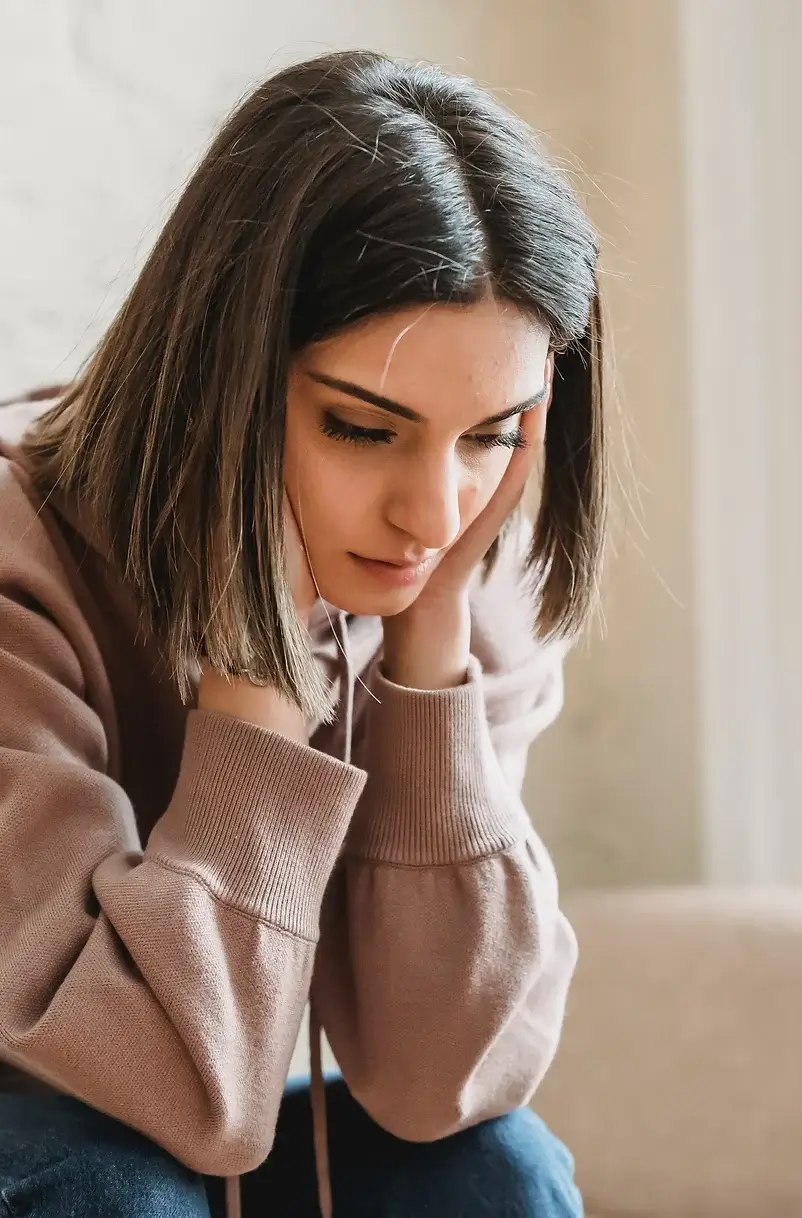Anxiety Therapy
Work With Your Anxiety, Not Against It
Anxiety can affect every aspect of our lives – from our relationships and careers to our mental and physical well-being. Quite frankly, it can be exhausting. You may have tried various methods to cope with your anxiety, such as avoiding triggers or using relaxation techniques. However, these methods may only provide temporary relief and do not address the root cause of your anxiety. Discovering that will be a focus of our collaboration.
Living in a beautiful beach town like Hermosa Beach, Manhattan Beach, or Redondo Beach – or anywhere in the South Bay area – may seem idyllic, with sun, surf, and sand, but that doesn’t mean your life is free from stress and anxiety. In fact, let’s be honest, it’s oftentimes only stress-free at the beach when you’re listening to the sound of the waves lapping against the shore. But once you step out of your little beach bubble, reality sets in and anxiety can creep back in. From the competitive environment of our jobs to the pressures of maintaining an active social life, it’s no wonder we experience anxiety regularly. Instead of resisting our anxiety, why not collaborate with it? Let it guide us towards areas that require our attention and embrace the opportunity to learn from it.
What are the Signs and Symptoms of Anxiety?

People Pleasing
Anxiety can often manifest as a tendency to “people please.” It’s a strong urge to prioritize others’ happiness, sometimes at the cost of your own well-being. You might constantly say yes to avoid conflicts or let others down, even if it means overwhelming yourself and neglecting your own needs.
Perfectionism
Low Self-Esteem
Anxiety can also show up as low self-esteem. You might find yourself doubting your abilities, constantly questioning your worth. It can make you feel like you’re not measuring up to others or that you’re just not good enough. These negative thoughts create a never-ending cycle of self-doubt and anxiety.
Burnout
When anxiety becomes a constant companion, it can drain you to the point of burnout. It’s that feeling of being utterly exhausted and overwhelmed, both physically and mentally. It’s like your anxiety has this sneaky way of making you overwork, take on too much, and leave you feeling drained and stressed out. You might even catch yourself pulling those late nights, skipping meals, and neglecting self-care. And let me tell you, it’s not doing your overall well-being any favors.
Physical Symptoms
Mental Symptoms
In addition to physical symptoms, anxiety can have an impact on our thoughts and emotions. You may notice yourself frequently worrying, feeling overwhelmed, or having racing thoughts. Anxiety can also bring about feelings of fear, irritability, and restlessness. It’s important to address these symptoms as they can have a significant impact on your daily life and general mental wellness.
You can really never fully get rid of anxiety, but you can learn to live with it and manage the symptoms. Understanding your body’s cues and recognizing triggers is crucial in this process. Because what is anxiety? It’s a coping mechanism. It’s actually a beautiful way your body tells you that something is not right, and you need to address it. Anxiety therapy in Hermosa Beach, CA is a place where you can learn to embrace your anxiety, understand its origins, and work with it instead of against it.
The Different Types of Anxiety
- High-Functioning Anxiety
High-functioning anxiety is not a diagnosable disorder, but it is a way to describe individuals who appear to have everything under control and are high achievers despite experiencing significant anxiety. They may seem successful on the outside, but internally they are struggling with constant doubts, worries, and fears. Often these individuals experience imposter syndrome and feel like they are constantly wearing a mask in front of others.
- Social Anxiety
Social Anxiety, sometimes known as Social Phobia, is when you experience intense anxiety and self-consciousness in social situations. It’s like having a fear of being judged or humiliated, which makes you want to avoid those situations completely. And there are times when you think, “Oh no, I said something stupid” or “I looked really silly,” which just adds to the feelings of shame and embarrassment. It’s tough, and it can even make you avoid social situations altogether.

- Generalized Anxiety
Generalized Anxiety Disorder, or GAD, is a pretty common form of anxiety where individuals tend to worry excessively and uncontrollably about everyday situations. It can have quite an impact on daily life, causing physical symptoms, difficulty focusing, and interfering with daily tasks.
- Panic Attacks
Panic Disorder is when you experience sudden, intense fear and dread. It can come with physical symptoms like a racing heart, trembling, sweating, or shortness of breath. Panic attacks can happen out of the blue or in response to certain situations. The fear of having another panic attack can lead you to avoid certain places or situations.
- Specific Phobias
Specific Phobias are a common experience where you may feel intense fear and anxiety in response to certain objects or situations. These fears can include heights, flying, or spiders, to name a few examples. It’s important to acknowledge that these fears can cause significant distress and may interfere with daily life. If you or someone you know is struggling with specific phobias, seeking support and understanding can be beneficial.
What are the Causes of Anxiety?
- Past Traumatic Experiences
When you begin exploring your anxiety, you might uncover past experiences that have influenced your current patterns of thinking and behavior. These experiences can vary from childhood challenges to recent events that have had a lasting impact on you. Therapists often refer to them as “significant T” traumas, such as accidents or physical abuse, or “small t” traumas, like feeling consistently ignored by your parents or going through a tough separation. These experiences often serve as the underlying cause of anxiety and should be addressed in therapy to promote healing and progress.
- Lifestyle and Environmental Factors
Our lifestyle and environment can really play a role in our anxiety. Things like stress at work, money problems, relationship issues, and even the non-stop presence of social media can all mess with our mental health. It’s important to slow down, way down, and then take a moment to pause, breathe, and look around. Then check in and make changes when needed. Even if it’s as simple as saying no to one more project at work or taking a break from social media, it can make a big difference in managing anxiety.



- Genetics and Family History
Anxiety can be passed down through our genes, which means that if one of our parents or close relatives has experienced anxiety, our chances of experiencing it ourselves may be higher. It’s important to acknowledge our family history and how it might impact us. But it’s also important to remember that it doesn’t determine our fate when it comes to developing anxiety. Holistic therapy can assist us in navigating and accepting our personal and family history, enabling us to better manage our anxiety.
- Health Conditions and Medications
Certain health conditions or medications can potentially trigger or exacerbate anxiety. For example, thyroid issues have been known to give rise to anxiety symptoms. Additionally, certain medications, such as steroids, may have side effects that include an increase in anxiety. As a holistic therapist, my approach involves taking into account all aspects of my client’s health. I also work collaboratively with them to address any underlying issues that may contribute to their anxiety. This is why I make it a priority to collaborate with their healthcare providers to ensure a comprehensive and well-rounded approach to managing anxiety.
My Approach to Anxiety Therapy
So, I tend to approach anxiety therapy a little differently. By approaching it holistically. What does that mean? It means looking at the whole picture – mind, body, and spirit. I believe in taking a somatic approach to therapy, which means focusing on the body’s physical sensations and how they relate to our emotions and thoughts. This may allow you to gain insight into the root causes of your anxiety. Traditional talk therapy’s typical approach is to first tackle the cognitive side, which involves identifying and changing negative thought patterns.
While this can be highly effective in managing symptoms, it can at the same time, miss out on recognizing and addressing the underlying causes of anxiety. That’s why I believe in incorporating the body and all of its intelligence into our work together.
As a holistic anxiety therapist serving Hermosa Beach, Manhattan Beach, Redondo Beach, and the broader South Bay area, my primary focus is on promoting optimal well-being in mind, body, and spirit, rather than solely addressing symptoms. I believe that a holistic approach to therapy may incorporate mind-body practices like mindfulness, meditation, breathwork, sound healing, and yoga to facilitate the healing journey.
You'll Receive Tools Along the Way
Don’t get me wrong, I am all about providing practical tools and techniques, cognitive and otherwise, to help you manage your anxiety. We’ll definitely do that, but we may be adding the other important information that comes directly from within and around you. My ultimate goal is for you to gain a deeper understanding of yourself – mind, body, and spirit – so that you can continue on your healing journey outside of therapy sessions. Embracing your anxiety and learning from it may not be easy, but it can bring about significant transformation and growth.
Please know the tools I share are oftentimes the very same tools I use or have used myself. Along with being a Licensed Marriage & Family Therapist, I’m also a Certified Holistic Therapist, which means I am a Certified Trauma-Informed Therapist, a certified Sound Healer, a Meditation and Breathwork facilitator, and a Certified Yoga Teacher (CYT 300)
I believe in the power of integrating various healing modalities to address anxiety from all angles. So, not only will you receive tools from traditional therapy techniques, but you’ll also get to experience mind-body practices to promote the power of vibration and frequency to promote relaxation and healing.

Ready to Embrace Your Anxiety With Anxiety Therapy in Hermosa Beach, Manhattan Beach, Redondo Beach, and the South Bay area?
If you’re ready to work with your anxiety and gain a deeper understanding of yourself, let’s start your healing journey together. I’m Marilyn Ashley, a holistic therapist based in Hermosa Beach, CA. My goal is to help you find peace and balance in your mind, body, and spirit. Together at my Hermosa Beach, CA practice, I work with adult clients from Manhattan Beach, CA, Redondo, Beach, CA, El Segundo, CA and the rest of the South Bay area, and we’ll work toward embracing your anxiety and using it as a tool for growth and transformation. If you’re ready to take the first step:
Schedule Your 20-Minute Complimentary Phone Consultation
Learn More About Me and My Services
Work With Your Anxiety, Not Against It Today!
Other Services Offered By Marilyn Ashley, LMFT
Anxiety Therapy is just one of the services I offer. I specialize in Life Transitions, Relationship Dynamics, Trauma, and Couples Therapy. Together at my Hermosa Beach Practice, I work with adult clients from Manhattan Beach, CA, Redondo, Beach, CA, El Segundo, CA, and the rest of the South Bay area, and we work toward embracing your anxiety and sing it as a tool for growth and transformation. I also offer online therapy sessions for those located anywhere in California, Colorado, Florida, South Carolina, and Kansas. By incorporating holistic practices into your daily life, you can support your overall well-being. I’m excited to work with you on your journey towards healing and growth. Together, let’s embrace your anxiety and learn how to thrive, not just survive!
FAQs
Do I Need Therapy for Anxiety?
This is a big question that you may be asking yourself. Feeling uncertain or apprehensive about therapy is completely normal and valid. When you recognize there is a need for therapy, it can bring up a lot of emotions and fears. It’s alright to feel hesitant — this is a significant step and it’s normal to navigate mixed emotions. But look inward and ask yourself if you believe therapy can be beneficial for you. Ask yourself if you are willing to take a chance and invest in your well-being. If you’ve answered yes, even with some hesitation or fear, then therapy may be a helpful tool for you.
Or, if your answer is still uncertain, you can always schedule a consultation with me to discuss your concerns and see if therapy is the right fit for you at this time. Ultimately, the decision to start therapy is yours and I will always respect and support your choices. I am here to support you through whatever challenges you may be facing and help you find hope, resilience, and healing. So, if you’re ready to take the first step towards holistic well-being, I am here for you.
Is it Possible to Receive Anxiety Treatment Without the Use of Medication?
Yes, it is absolutely possible to receive anxiety treatment without the use of medication. Deciding on medication is a personal decision. Whether you feel that medication is necessary or you’re looking for alternative methods, our goal will be the same—to find peace and manage anxiety in a way that’s aligned with who you are and what you need. I will support and guide you in finding a treatment plan that works for you, whether that includes medication or not.
Through various holistic techniques and supportive therapy, we will work together to address the root causes of your anxiety and develop coping strategies to manage symptoms. My priority is always your well-being and I am committed to helping you find relief from anxiety in a way that feels right for you.
How Can I Quickly Reduce Anxiety?
Anxiety can be overwhelming and it’s natural to want quick relief. However, reducing anxiety is a process that takes time and effort. Therapy may be a gradual process but one that can ease symptoms and support you in working toward long-term healing. Some techniques, such as deep breathing, grounding exercises, and mindfulness practices, may bring immediate relief in the moment. But ultimately, it’s important to address the root causes of your anxiety through therapy in order to find long-term solutions and sustainable coping mechanisms.
Typically, within about six to eight weeks, you’ll begin to notice shifts in your patterns of thought and feeling. In our sessions, we will work together to identify triggers and develop personalized strategies to cope with them. You are not alone in this journey and I am here to support you every step of the way towards finding peace, resilience, and well-being. So, even though it may take time, know that there is hope for managing and reducing anxiety through holistic therapy. Let’s work together towards your healing and growth.
